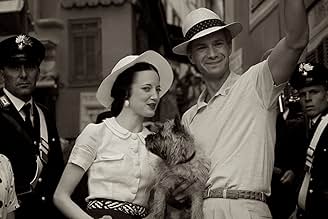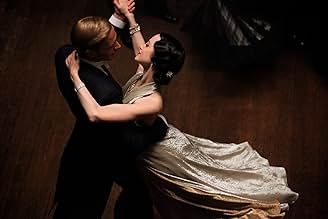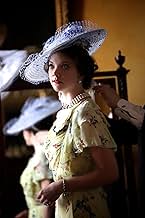The affair between King Edward VIII and American divorcée Wallis Simpson, and a contemporary romance between a married woman and a Russian security guard.The affair between King Edward VIII and American divorcée Wallis Simpson, and a contemporary romance between a married woman and a Russian security guard.The affair between King Edward VIII and American divorcée Wallis Simpson, and a contemporary romance between a married woman and a Russian security guard.
- Nominated for 1 Oscar
- 4 wins & 6 nominations total
- Director
- Writers
- All cast & crew
- Production, box office & more at IMDbPro
Featured reviews
The cross-cutting between 2 timelines and locations for no apparent reason was not only confusing, it was also annoying. By the time we got into the story proper, I was so ticked off I didn't care about any of the characters, quite apart from the fact that I couldn't work out what was going on. This is definitely one of those "look-at-my-filmmaking-skillz" types of films, which makes it so hard to watch and enjoy. This is the first film by Madonna I have watched and will almost certainly be my last.
W.E. (2011)
Don't even think about who directed this. Think of it as a multi-layered, multi-era epic centering on the marriage of King Edward and his American love, Wallis Simpson. He's the English king who abdicated for love. But this is the story of the love, Wallis, the woman who gave up as much as the king did, or so the thrust of the movie suggests.
It's rather good! It mixes a bit of fantasizing with a contemporary woman, Wally, finding her obsession with the Wallis of history (1930s) is more than coincidence. The narrative flips between several parts of the royal story before WWII and the contemporary version, which includes a budding relationship with a guard at an exhibition of Wallis Simpson memorabilia.
Whether you find either story convincing doesn't matter. One of them is of course based on history, and is interesting if you don't already know the facts. The other is an echo of the same, with the woman having to become strong and independent just as her earlier namesake did.
What is most interesting is the way the two stories are inter-spliced, including some scenes where the two times zones are mixed (apparently in Wally's head, but it's very real to the audience). We start to see how often and completely women are stuck in situations they would not choose if they knew ahead of time. It's about independence, yes, but also failure to be independent and the consequences. And maybe it's about learning a little from history.
The director? Madonna. Yes, the singer from Michigan. The director of the terrible bomb "Filth and Wisdom." Here there is some real cinematic intelligence. It's a good movie. Flawed, a bit longer than it needs to be, a bit forced in the layering of stories, but well acted and conceived.
Don't even think about who directed this. Think of it as a multi-layered, multi-era epic centering on the marriage of King Edward and his American love, Wallis Simpson. He's the English king who abdicated for love. But this is the story of the love, Wallis, the woman who gave up as much as the king did, or so the thrust of the movie suggests.
It's rather good! It mixes a bit of fantasizing with a contemporary woman, Wally, finding her obsession with the Wallis of history (1930s) is more than coincidence. The narrative flips between several parts of the royal story before WWII and the contemporary version, which includes a budding relationship with a guard at an exhibition of Wallis Simpson memorabilia.
Whether you find either story convincing doesn't matter. One of them is of course based on history, and is interesting if you don't already know the facts. The other is an echo of the same, with the woman having to become strong and independent just as her earlier namesake did.
What is most interesting is the way the two stories are inter-spliced, including some scenes where the two times zones are mixed (apparently in Wally's head, but it's very real to the audience). We start to see how often and completely women are stuck in situations they would not choose if they knew ahead of time. It's about independence, yes, but also failure to be independent and the consequences. And maybe it's about learning a little from history.
The director? Madonna. Yes, the singer from Michigan. The director of the terrible bomb "Filth and Wisdom." Here there is some real cinematic intelligence. It's a good movie. Flawed, a bit longer than it needs to be, a bit forced in the layering of stories, but well acted and conceived.
The cast alone makes this film worth watching. This was the first I watched with Oscar Isaac, and he truly generates heat in every scene with Abbi Cornish. Andrea Riseborough gives a star making performance that should have been recognized when the film was originally released. Madonna, as a director, knows how to let her cast do their thing and brings a stylish eye to the set design and costumes. Of course the critics were ready with their claws out but anyone who watches the film with an objective eye will be pleasantly rewarded.
The much maligned, brief theatrical film by Madonna - W.E. - fairs better on the small screen than it likely did in the movie houses. The stories are bifurcated, each one resembling a television creation - one a docudrama biopic, the other a contemporary soap opera. That Madonna, who directed and wrote the screenplay with Alek Keshishian, decided to mix the two stories is a bit daring but in some ways it works very well. In other ways the parallel stories seem like time traveling cars on the same highway that never quite travel at the same speed or quality.
The film mixes the notorious affair between King Edward VIII and American divorcée Wallis Simpson with a contemporary romance between a married woman and a Russian security guard. The time is 1998 and at an auction of the estate of the Duke and Duchess of Windsor unhappily married ex-Sotheby employee Wally Winthrop (Abbie Cornish) becomes obsessed by their historic love story. Her own marriage to womanizing, abusive psychiatrist William (Richard Coyle) undermines her feelings of worth and as she learns more about the sacrifices involved in the famous affair, she gains her own courage to find happiness.
The film flips back and forth between the present and the 1930s and it is the historical aspect of the film that is almost flawless. We get to know Wallis Simpson (in a brilliant portrayal by Andrea Riseborough) and understand her failed first two marriages (at the time we meet her she is still married to Ernest Simpson played by David Harbour), and see the American sizzle that made her the talk of England. When Wallis wrangles her way to meet Prince Edward, better known as David, (James D'Arcy) there is a chemistry that develops to the point of passion and ultimately leads to Wallis divorcing Ernest to marry Edward - a deed that leads to Edward's abdication of the throne for 'the woman I love', which he had assumed when King George V (James Fox) dies, to his stammering brother Bertie (Laurence Fox) and his caustic wife Elizabeth (Natalie Dormer). The paparazzi make their life miserable and the couple is not allowed to return to England until Edward dies, with the faithful Wallis supportively by his side through 36 years of marriage.
Wally - meanwhile - longs to be pregnant but sustains such abuse from William that she ultimately yields to the loving friendship the auction house Russian security guard Evgeni (Oscar Isaac) and begins her life again. The two stories are connected by Wally's obsession with the royal couple's notorious affair and at auction's end she is given access to private letters between Wallis and Edward that have been in the possession of Mohamed Al-Fayed (Haluk Bilginer) - a tacked on ending that feels ill at ease and redundant.
Everyone connected t the biopic angle of this film is excellent and Madonna shows that she knows how to direct affairs of the heart in a royal situation very well indeed. Both Andrea Riseborough and James D'Arcy are superb and the costumes and music and cinematography of this historical portion are exceptionally well done. Though the idea of the contemporary sluggish story is reasonable, Abbie Cornish seems uncomfortable with the script: Oscar Isaac shines as her new love. In all the film, though spotty, has merit and it not a bad debut for Madonna as director.
Grady Harp
The film mixes the notorious affair between King Edward VIII and American divorcée Wallis Simpson with a contemporary romance between a married woman and a Russian security guard. The time is 1998 and at an auction of the estate of the Duke and Duchess of Windsor unhappily married ex-Sotheby employee Wally Winthrop (Abbie Cornish) becomes obsessed by their historic love story. Her own marriage to womanizing, abusive psychiatrist William (Richard Coyle) undermines her feelings of worth and as she learns more about the sacrifices involved in the famous affair, she gains her own courage to find happiness.
The film flips back and forth between the present and the 1930s and it is the historical aspect of the film that is almost flawless. We get to know Wallis Simpson (in a brilliant portrayal by Andrea Riseborough) and understand her failed first two marriages (at the time we meet her she is still married to Ernest Simpson played by David Harbour), and see the American sizzle that made her the talk of England. When Wallis wrangles her way to meet Prince Edward, better known as David, (James D'Arcy) there is a chemistry that develops to the point of passion and ultimately leads to Wallis divorcing Ernest to marry Edward - a deed that leads to Edward's abdication of the throne for 'the woman I love', which he had assumed when King George V (James Fox) dies, to his stammering brother Bertie (Laurence Fox) and his caustic wife Elizabeth (Natalie Dormer). The paparazzi make their life miserable and the couple is not allowed to return to England until Edward dies, with the faithful Wallis supportively by his side through 36 years of marriage.
Wally - meanwhile - longs to be pregnant but sustains such abuse from William that she ultimately yields to the loving friendship the auction house Russian security guard Evgeni (Oscar Isaac) and begins her life again. The two stories are connected by Wally's obsession with the royal couple's notorious affair and at auction's end she is given access to private letters between Wallis and Edward that have been in the possession of Mohamed Al-Fayed (Haluk Bilginer) - a tacked on ending that feels ill at ease and redundant.
Everyone connected t the biopic angle of this film is excellent and Madonna shows that she knows how to direct affairs of the heart in a royal situation very well indeed. Both Andrea Riseborough and James D'Arcy are superb and the costumes and music and cinematography of this historical portion are exceptionally well done. Though the idea of the contemporary sluggish story is reasonable, Abbie Cornish seems uncomfortable with the script: Oscar Isaac shines as her new love. In all the film, though spotty, has merit and it not a bad debut for Madonna as director.
Grady Harp
Far from the best or worst picture of the year, W.E. is certainly the most intriguing. It tells the story of Wallis Simpson (Andrea Riseborough) and the New York housewife who is obsessed with her in 1998 (played by Abbie Cornish). This is not a straightforward historical film, nor is it trying to be. Instead, the film is a mediation on celebrity, history and the way people search in those realms for meaning in their own lives. For example, Wally in 1998 is trapped in a loveless marriage where she is virtually ignored by everyone, so she imagines Wallis as utterly fabulous, and adored by the man who abdicated for her. "What are you thinking about?" she is asked at one point. She responds, "What it must feel like to be loved that much". Madonna hits that nail right on its head, and this premise is the reason she can't tell the story from a straight historical perspective--celebrities really only exist in our heads. Madonna likely knows this better than anyone. For this reason, Wally waves away her idols alleged Nazi sympathies and the possibility that she and Edward's marriage was not all that it seemed, because in New York in 1998, she needs to believe that love can be eternal. In this context, the much maligned scenes in which Wallis appears to Wally to give advice make perfect sense. All celebrities and historical figures really are figments of our imaginations anyway.
In the end, the theme is that people should not obsess over celebrities, but should "get a life" of their own. This brings us to the films one serious downfall. The audience is forced to spend more than half the movie with Wally, who is beyond boring and unsympathetic. This can be blamed on the script and the performance by Abbie Cornish, who never seems to do any more than pose and read lines. The character was never believable or engaging, and the script must resort to over the top melodrama to move her story along. In short, the 1998 storyline is a mess, and you'd think that a film whose premise is that celebrity-obsessed people need to get a life would have known better than to focus on an obsessed fan with no life.
That said, everything with Wallis is spot on, better even than anything found in "The King's Speech" (2010). Andrea Riseborough, who plays Wallis accomplishes in a single scene what Abbie Cornish couldn't in all of the movie. She makes us admire and care for the woman she's playing. She has a charisma (much like the director herself) that guarantees the indulgence of the audience. She is going to be naughty, and we're going to love her for it.
And thus you have the most interesting movie of the year: half masterpiece, half slog. If the 1931 storyline had been stretched out to 90 minutes, and the 1998 one reduced to 10 or 15, this would have been one of the best films of the year. As it is, it a tremendous curiosity.
I must mention, however, the best scene in the movie, featuring an elderly Wallis and a dying Edward. I shan't give it away except to say that it captures perfectly both the sweetness of enduring love and the sadness, and inevitability of age and death. Where I was laughing derisively at the previous scene, this one had me in tears before it was through. Like I said, a very interesting experience.
I have refrained from mentioning its superstar director, because most critics can't seem to see past their feelings about her as a person. Still, I can't help but note that Madonna is vastly better suited to depict the lifestyles of the rich and fabulous, than the dreary doldrums of us common-folk.
In the end, the theme is that people should not obsess over celebrities, but should "get a life" of their own. This brings us to the films one serious downfall. The audience is forced to spend more than half the movie with Wally, who is beyond boring and unsympathetic. This can be blamed on the script and the performance by Abbie Cornish, who never seems to do any more than pose and read lines. The character was never believable or engaging, and the script must resort to over the top melodrama to move her story along. In short, the 1998 storyline is a mess, and you'd think that a film whose premise is that celebrity-obsessed people need to get a life would have known better than to focus on an obsessed fan with no life.
That said, everything with Wallis is spot on, better even than anything found in "The King's Speech" (2010). Andrea Riseborough, who plays Wallis accomplishes in a single scene what Abbie Cornish couldn't in all of the movie. She makes us admire and care for the woman she's playing. She has a charisma (much like the director herself) that guarantees the indulgence of the audience. She is going to be naughty, and we're going to love her for it.
And thus you have the most interesting movie of the year: half masterpiece, half slog. If the 1931 storyline had been stretched out to 90 minutes, and the 1998 one reduced to 10 or 15, this would have been one of the best films of the year. As it is, it a tremendous curiosity.
I must mention, however, the best scene in the movie, featuring an elderly Wallis and a dying Edward. I shan't give it away except to say that it captures perfectly both the sweetness of enduring love and the sadness, and inevitability of age and death. Where I was laughing derisively at the previous scene, this one had me in tears before it was through. Like I said, a very interesting experience.
I have refrained from mentioning its superstar director, because most critics can't seem to see past their feelings about her as a person. Still, I can't help but note that Madonna is vastly better suited to depict the lifestyles of the rich and fabulous, than the dreary doldrums of us common-folk.
Did you know
- TriviaFashion house Christian Dior recreated three dresses for this film that it had previously made for the real Wallis Simpson.
- GoofsIn the newsreel scene from 1936 showing the funeral procession of Edward's father the King, the voiceover announcer says that "King George the Third has died and the nation mourns". It should of course have been King George the Fifth.
- Quotes
Wallis Simpson: Darling, they can't hurt you if you don't let them.
- ConnectionsFeatured in Breakfast: Episode dated 3 September 2011 (2011)
- SoundtracksKarin
Written by Christoph Clöser, Morten Gass
Performed by Bohren & Der Club of Gore
Published by Manuskript © (P) Bohren & Der Club of Gore released under exclusive license by [Pias] Recordings 2008
- How long is W.E.?Powered by Alexa
Details
- Release date
- Countries of origin
- Official sites
- Languages
- Also known as
- Chuyện Tình Thế Kỷ
- Filming locations
- Production companies
- See more company credits at IMDbPro
Box office
- Budget
- $15,000,000 (estimated)
- Gross US & Canada
- $583,455
- Opening weekend US & Canada
- $47,074
- Feb 5, 2012
- Gross worldwide
- $2,042,203
- Runtime
- 1h 59m(119 min)
- Color
- Sound mix
- Aspect ratio
- 2.35 : 1
Contribute to this page
Suggest an edit or add missing content










































